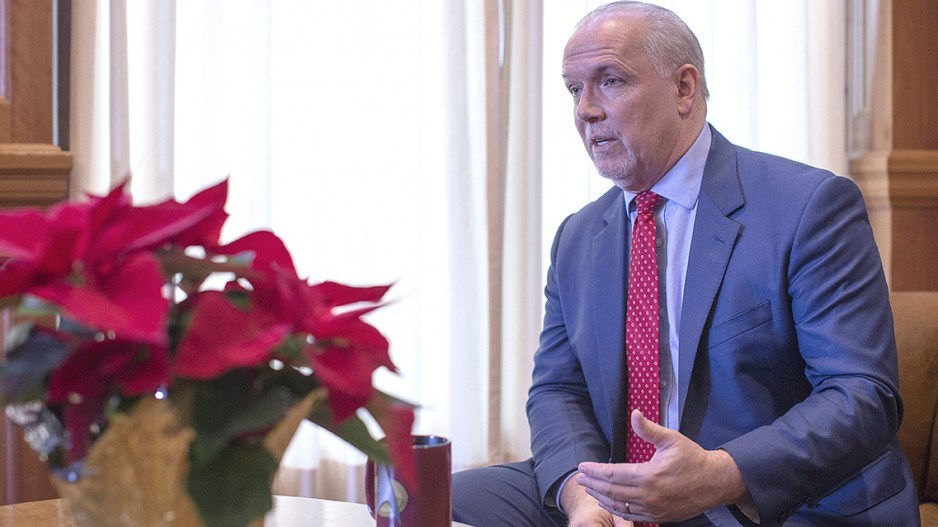The mantle has not come simply.
No one else wanted the job he took in 2014 to lead the BC NDP as official Opposition.
The province did not clearly elect the NDP in 2017 to lead B.C.
The subsequent skirmish to build an alliance in a minority government was neither easy nor elegant.
But John Horgan persisted, consulted, reflected and became B.C.’s 36th premier. He is the Business in Vancouver Newsmaker of the Year for 2017, a clear choice considering the political sea change he has conferred.
The landscape for his work might be shifting, but the MLA for the Vancouver Island riding of Langford-Juan de Fuca will say he has not been changed as much as he has come back to his truer, dominant self – the “hopeful, optimistic” self, not the Angry John holding government accountable.
“I’m pleased that I’m able to be myself every day and be accountable for what I do and what I say, rather than speculating and commenting on what someone else is doing.”
The John Horgan of today is surprised and touched, first and foremost, through this “12-month blur” by “the generosity of people” – the well-wishers, including those who didn’t vote for his party in a province often polarized by politics.
He could see a breakthrough coming, he said, when the BC Liberals misread the public’s need to make life better and campaigned on the status quo. In particular, they were not making any commitments on a “woefully inadequate” education file.
While Liberals in May elected more MLAs – 43 to the NDP’s 41 – the three-person BC Green Party caucus held the balance of power and needed to be courted. Horgan feels the Liberals’ approach was transactional, rather than about values.
“Rather than talk about what I can give you, we talked about what we could do together,” he said.
A confidence covenant was created that aims for a four-year relationship.
Minority governments might not always be optimal, but they have to operate more nimbly. It’s proving to be a good thing, Horgan said.
“I believe I’m doing a better job and my colleagues are doing a better job because we have to be mindful every day within every decision [on whether] it’s going to have a negative effect on our relationship with other people.
“Majority governments don’t have to do that. Over time they become smug and arrogant – regardless of whether they’re Liberal, NDP, Conservative or Green. It’s almost an inevitability.”
His toughest call to date? “Site C, without a doubt.” The decision this month to proceed with the massive hydroelectric project confronted divisions across generations, even families.
“My wife had a difference of opinion on the question,” he noted.
But the deliberation by caucus effected a maturity and recognition that governments have to be for the broadest possible interests of the people served. He knows, though, there are difficult relationships to mend in the time ahead.
“There was no easy answer.”
Nor were these the easiest times to take the job. Despite a government surplus of $2.7 billion, Horgan walked into the province’s most devastating wildfires – $600 million in suppression costs alone, much more than that in economic damage to tourism, forestry, agriculture and community life, with pressure to make sure the province is ready when the fires inevitably return.
Horgan, 58, possessed some bona fides in business before he became premier, having served as an opposition critic on energy and mines. As he was ascending to the premier’s job, he sought what seems an unlikely source.
“I reached out to Jimmy Pattison … and asked him for his advice.”
He recognizes that the business community can be inherently suspicious of left-of-centre governments and their interventionist tendencies. But in his many presentations and discussions with business groups in his first few months, he sees a more positive sign as he reaches out.
“I’ve been trying to be present and available to people, to give them comfort that I have purpose – and that purpose is to continue the prosperity in British Columbia. And I can’t do it if the captains of industry are not onside.”
He sees government’s role as threefold for business: develop a skilled workforce, ensure modern infrastructure and nurture a health-care system upon which people can depend.
There are, and will be, obvious headwinds.
“The softwood lumber deal profoundly disappointed us – that such a narrow, narrow group of individuals and companies in the United States could have such a profound impact on Canada and the U.S. and our relationship.”
The challenges ahead: the North American Free Trade Agreement, housing affordability, education – “I could go on. The list is long.”
The regrets?
He would have preferred to have been in the legislature as it discussed amendments to the proportional representation law to reassure doubters. He intends to do so in the new year.
The style he wants is of a leader who is an open book with challenges.
“My approach to things has always been: address them when they arrive, deal with them openly, be candid and up front with people as to why you’re making decisions.”
And, just as his Grade 3 arithmetic teacher would demand when he had an answer but did not demonstrate his process: “show your work.”
The next few weeks will include deliberations on the government’s first budget, and it would be fair to say there remain some apprehensions on how the NDP will deliver change without upending the economy. Horgan offers no real hints of what’s ahead, except that he took the job obviously believing government can make a difference in lives, particularly in any times of distress.
By this time next year, “I would hope people would see a government working for them.” •




